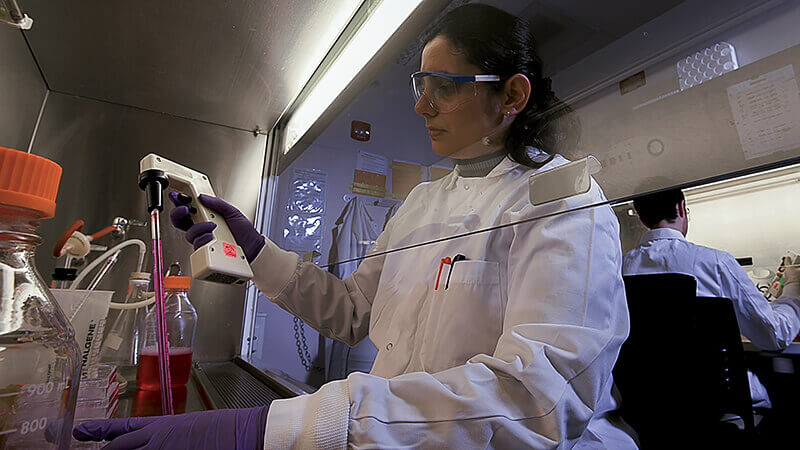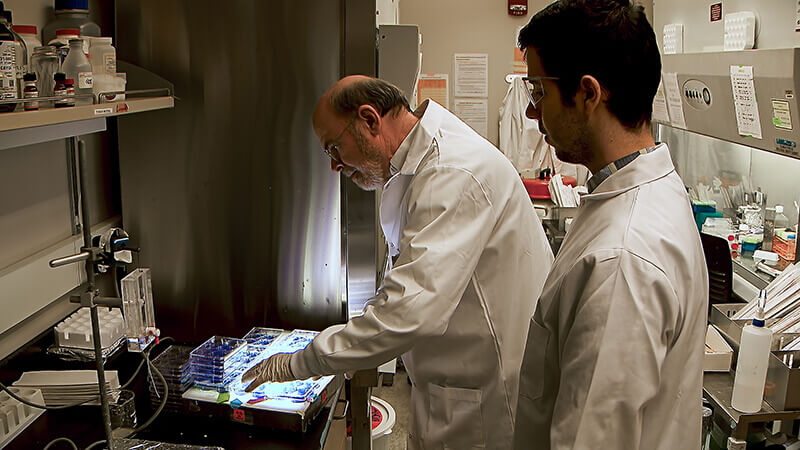March 31, 2020
Purdue researchers leap to discover more about coronavirus

Purdue University researchers currently have more than 20 research projects underway to understand, prevent, treat, and overcome the COVID-19 pandemic. Here virology researcher Devika Sirohi works in a laboratory in the Purdue Institute of Inflammation, Immunology and Infectious Disease (P4ID). (Purdue University image by Ted Schellenberger.)
WEST LAFAYETTE, Ind. — As the novel coronavirus pandemic approaches 1 million cases worldwide, Purdue University researchers have launched more than 30 research projects and have applied for funding for nearly 20 additional projects.
Theresa Mayer, executive vice president for research and partnerships, says the research at Purdue on aspects of the pandemic began more than two months ago.
"Many of our scientists and engineers began shifting their work to the novel coronavirus soon after it first became known, even before the first scientific articles about the virus were published in early February," she said. "For example, Andy Mesecar, who has studied various coronaviruses for most of his career, received genetic information about the virus on Friday, January 17, and began synthesizing the genes for producing a set of target proteins that would make suitable drug targets.
"Our faculty members have responded with urgency and energy to address this global pandemic."
 Purdue virologist Richard Kuhn (left) and graduate student Carlos Brito check in on virus in Kuhn’s laboratory. Kuhn, who is leading Purdue’s Coronavirus Task Force, says there are currently more than 20 research projects underway at the university to deal with the COVID-19 pandemic. (Purdue University image by Ted Schellenberger.)
Download image
Purdue virologist Richard Kuhn (left) and graduate student Carlos Brito check in on virus in Kuhn’s laboratory. Kuhn, who is leading Purdue’s Coronavirus Task Force, says there are currently more than 20 research projects underway at the university to deal with the COVID-19 pandemic. (Purdue University image by Ted Schellenberger.)
Download image
Richard Kuhn, Purdue's Trent and Judith Anderson Distinguished Professor in Science and the Krenicki Family Director of the Purdue Institute of Inflammation, Immunology and Infectious Disease, said that a wide variety of Purdue researchers have come forward saying that they are working to understand, prevent, treat, and overcome the COVID-19 pandemic.
"Some of our researchers are part of national or international collaborative research projects, and some launched research just with their labs, many establishing internal Purdue teams. Either way, we've had an outpouring of researchers who are doing what they can to address this global problem."
Kuhn, who chairs Purdue's Coronavirus Research Task Force, is editor-in-chief of the scientific journal Virology.
The research being conducted at Purdue falls into these general areas:
Understanding the virus and improving scientific methods: Discovering more about how SARS-CoV-2 infects cells, developing methods that can amplify extremely small amounts of the viral genome to complement current testing methods, and purifying and producing specific proteins from the virus to aid in drug screening and vaccine development.
Researchers involved in this effort include Kuhn; Raluca Ostafe, director, Molecular Evolution, Protein Engineering, and Production facility; Jorge Rodriguez, associate professor, physics; Cagri Savran, professor, mechanical engineering; and, W. Andy Tao, professor, biochemistry.
Development of diagnostic tools: Efforts on finding individuals with COVID-19 and engineering improved diagnostic tools is the focus of six research efforts, which include paper tests that are similar to home pregnancy tests, developing a sensing device that can detect nCoV from saliva, and optical sensing tools that can detect minute quantities of the virus.
Researchers working on diagnostic tools include Lia Stanciu-Gregory, professor, materials engineering; Jacqueline Linnes, assistant professor, biomedical engineering; Tamara Kinzer-Ursem, associate professor, biomedical engineering; and Mohit Verma, assistant professor, agricultural and biological engineering.
Development of therapeutics: Purdue has a long history of success in drug discovery. One of the researchers involved in coronavirus research, Arun Ghosh, developed an anti-viral HIV/AIDS drug, Darunvir (which includes his name in the product name, D-Arun-vir). Current efforts include screening and identifying compounds that are potential anti-viral drugs, raising antibodies to neutralize the virus, and discovering vaccine components.
Researchers involved in this effort include Ruben C. Aguilar, associate professor, biological sciences; Vincent "Jo" Davisson, professor, medicinal chemistry and molecular pharmacology; Arun Ghosh, Purdue's Ian P. Rothwell Distinguished Professor of Organic and Medicinal Chemistry; Philip Low, Purdue's Ralph C. Corley Distinguished Professor of Chemistry; and Robert Stahelin, medicinal chemistry, molecular pharmacology.
Improving current medical supplies: Purdue engineers in several departments have been looking at medical supplies that are in short supply and investigating if there are ways to produce them faster or produce products that can be disinfected more easily.
An effort to develop injection molded N95 masks which use replaceable filters and can be disinfected, includes Nathan Hartman, Purdue's Dauch Family Professor of Advanced Manufacturing and Head of Computer Graphics Technology, co-executive director of the Indiana Next-Generation Manufacturing Competitiveness Center (IN-MaC); David McMillan, assistant director, Bechtel Innovation Design Center; Paul McPherson, assistant professor, engineering technology; Andrew Miller, laboratory manager, biological sciences; Andrew Pierce, assistant director, Engineering Projects in Community Service (EPICS); Mark Sharpe, director, technical, College of Pharmacy; and Brian Overshiner, manager, Indiana University Health 3D Innovation Project Lab.
Thomas Sors, assistant director of the Purdue Institute of Inflammation, Immunology, and Infectious Disease, said that in addition to the expertise found in the university faculty, Purdue also has a wealth of advanced research tools found in laboratories in Discovery Park that is speeding the work.
"Purdue has state-of-the-art equipment that allows us to address many of the scientific issues of the COVID-19 pandemic," he said. "We're fortunate to have robotic bioassay machines, advanced cryo-electron microscopes, advanced molecular detection technologies, and a high-level biocontainment laboratory that allows for virus and drug testing. We've been able to give our scientists the tools they need to speed the science."
About Purdue University
Purdue University is a top public research institution developing practical solutions to today’s toughest challenges. Ranked the No. 6 Most Innovative University in the United States by U.S. News & World Report, Purdue delivers world-changing research and out-of-this-world discovery. Committed to hands-on and online, real-world learning, Purdue offers a transformative education to all. Committed to affordability and accessibility, Purdue has frozen tuition and most fees at 2012-13 levels, enabling more students than ever to graduate debt-free. See how Purdue never stops in the persistent pursuit of the next giant leap at purdue.edu.
Media contact: Steve Tally, 765-494-9809, steve@purdue.edu, @sciencewriter
Sources: Richard Kuhn and Thomas Sors. Interviews can be arranged through Steve Tally of the Purdue News Service at 765-494-9809 or steve@purdue.edu.
Note to Journalists: B-roll and photographs of researchers working in virology labs are available for journalists to use in a Google Drive folder at https://purdue.university/2WXpyTG.

